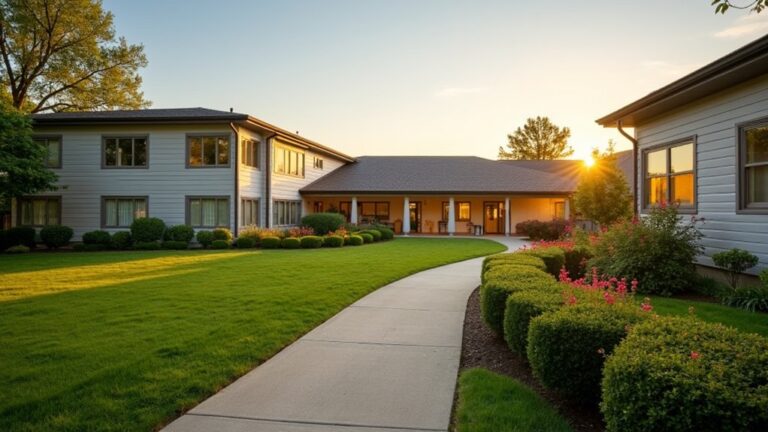Why Choose Residential Care for Memory Care?

When choosing residential care for memory care, you’re opting for a supportive haven tailored to your loved one’s unique needs. You’ll find specialized staff who provide compassionate, personalized attention to guarantee dignity and safety. Secure environments prevent wandering, while structured routines reduce anxiety and boost cognitive health. Engaging activities and community spaces foster connection and purpose. Stick with us to uncover more about how this care transforms lives with warmth and expertise.
Key Takeaways
- Residential care offers specialized support tailored to unique memory care needs.
- Trained staff provide compassionate, personalized attention for dignity and safety.
- Secure environments prevent wandering and minimize risks with alarmed entrances.
- Structured routines reduce confusion and support cognitive health daily.
- Community settings foster connections, reducing isolation and enhancing well-being.
Understanding Memory Care Needs in Residential Settings

As you consider residential care for a loved one with memory challenges, it’s essential to understand their unique needs in a supportive setting. You’re not just finding a place to stay; you’re seeking an environment where they feel safe and valued.
Memory issues often bring confusion, frustration, and a need for routine. You’ve got to look for a setting that offers personalized attention, helping them navigate daily tasks with dignity.
Memory challenges can cause confusion and frustration. Seek a setting with personalized care, ensuring daily tasks are managed with dignity and respect.
Think about how their emotional and physical needs shift over time. You’ll want caregivers who recognize subtle changes and respond with compassion.
Verify the space is designed to reduce stress—think familiar layouts and calming surroundings. You’re entrusted with their well-being, so ask questions about staff training and daily activities that engage their mind and spirit. Additionally, consider the benefits of a homelike environment that promotes comfort and community in memory care.
Benefits of Specialized Support in Care Homes
While exploring residential care options, you’ll quickly notice the profound impact of specialized support in memory care homes. As someone dedicated to serving others, you’ll appreciate how these environments are designed with expertise to meet unique needs.
Trained staff understand the complexities of memory conditions and offer compassionate, skilled assistance that fosters dignity and safety. You’ll see how they create structured routines that reduce confusion and provide stability for residents.
Beyond basic care, you’ll find that specialized support includes engaging activities tailored to stimulate cognitive function and encourage social connection.
You can take pride in knowing that your loved one benefits from a community where staff are equipped to handle challenging behaviors with patience and understanding. By choosing a care home with this level of expertise, you’re ensuring a nurturing space where those with memory impairments can thrive under dedicated, informed guidance every day. Additionally, facilities like Sage Oak of Denton provide personalized attention to enhance the quality of life for residents with memory care needs.
Personalized Attention for Memory Challenges

When you consider memory care options, you’ll notice that personalized attention forms the cornerstone of effective support for memory challenges. As someone dedicated to serving others, you understand the importance of tailoring care to each individual’s unique needs.
In residential care, staff take the time to learn about your loved one’s history, preferences, and specific memory issues, creating a plan that respects their dignity and fosters connection.
You’ll see caregivers engaging directly with residents, using personalized activities to stimulate memory and encourage emotional well-being. Whether it’s reminiscing over cherished photos or adapting daily routines to reduce frustration, they’re committed to making a difference.
You can trust that your loved one receives one-on-one support, ensuring they feel valued and understood. By choosing residential care, you’re providing them with compassionate, individualized attention that truly honors their journey and supports their unique challenges every day. Additionally, these facilities often provide 24/7 support from well-trained staff to ensure a safe and nurturing environment.
Safe and Secure Environments for Seniors
Beyond personalized attention, you’ll find that residential care prioritizes safe and secure environments for seniors facing memory challenges. When you choose this option for a loved one, you’re ensuring they live in a space designed to prevent wandering and reduce risks.
Facilities often feature secure entrances, alarmed doors, and enclosed outdoor areas, so you can rest easy knowing they’re protected from potential hazards.
You’ll also notice that staff members are trained to handle emergencies with care and vigilance. They’re always on hand to monitor safety, whether it’s preventing falls or addressing sudden health concerns.
The layouts are intentionally simple, with clear signage and familiar surroundings to minimize confusion. By opting for residential care, you’re giving your loved one a haven where their well-being is the top priority. Additionally, caregivers are specifically trained for Alzheimer’s and related dementia support, ensuring that residents receive expert care tailored to their unique needs.
You’re not just providing a home; you’re offering peace of mind through a secure, nurturing environment.
Structured Daily Routines for Cognitive Health

As you explore residential care for a loved one with memory challenges, you’ll discover the value of structured daily routines for supporting cognitive health. These routines provide a sense of stability and predictability, which can ease anxiety and confusion.
By engaging in consistent activities like meals, exercise, and social events at set times, you’re helping your loved one maintain mental clarity and reduce stress. This structure fosters a comforting rhythm to their day, reinforcing memory through repetition.
You’ll notice how these planned schedules encourage participation in meaningful tasks, such as crafts or reminiscence sessions, which stimulate the mind and promote emotional well-being. Additionally, the personalized care plans in memory care programs are designed to cater to individual preferences, further enhancing the effectiveness of these routines.
When you choose residential care, you’re ensuring a nurturing environment where daily patterns are tailored to support cognitive needs. Your dedication to their care shines through in prioritizing a setting that offers this essential consistency for their mental health and happiness.
Access to Trained Staff for Memory Support
Let’s explore another essential aspect of residential care: access to trained staff for memory support.
When you choose residential care for a loved one with memory challenges, you’re ensuring they receive expert attention from professionals who understand their unique needs. These staff members aren’t just caregivers; they’re trained in memory care techniques, helping manage symptoms and providing compassionate support.
You’ll find peace knowing that skilled individuals are there 24/7 to assist with daily tasks, offer emotional reassurance, and adapt care plans as needs evolve. They’re equipped to handle difficult moments with patience, using specialized strategies to reduce anxiety and confusion. By entrusting your loved one to these dedicated experts, you’re giving them a safe, supportive environment where their dignity is always prioritized.
This access to trained staff means you can focus on cherishing your time together, knowing they’re in capable, caring hands every day. Furthermore, these professionals are trained to recognize changes in mood and personality, allowing them to respond effectively to emotional fluctuations and ensure a stable atmosphere for residents.
Community and Social Engagement Opportunities
While trained staff provide essential support, community and social engagement opportunities in residential care enrich your loved one’s life with meaningful connections.
You’ll find that these communities create a warm, welcoming environment where your family member with memory challenges can thrive. They offer structured activities like group games, art classes, and music therapy, tailored to stimulate cognitive function and foster friendships.
You can feel good knowing they’re not isolated but surrounded by peers who understand their journey.
Beyond planned events, you’ll see spontaneous interactions in shared spaces like gardens or dining areas, sparking joy and a sense of belonging.
As someone who wants to serve, you’ll appreciate how these settings encourage participation, helping your loved one maintain dignity and purpose. Additionally, the trained caregivers ensure that each resident receives personalized attention and care, further enhancing their overall well-being.
Frequently Asked Questions
What Is the Cost of Residential Memory Care?
Wondering about the cost of residential memory care? You’re taking a crucial step to support someone you care for deeply.
Costs can vary widely, from $4,000 to $8,000 monthly, depending on location, facility amenities, and the level of care needed.
Don’t hesitate to research options and ask facilities for detailed pricing. You’ll find the right fit to guarantee your loved one receives compassionate, tailored support every day.
How Are Family Visits Accommodated in Care Homes?
When you’re wondering how family visits are accommodated in care homes, know that you’ll find welcoming policies designed to nurture connections.
You can visit loved ones often, with many homes offering flexible hours to fit your schedule. You’re encouraged to join activities or share meals, fostering joy and support.
Check specific visiting guidelines with the facility, but rest assured, you’ll play a crucial role in their well-being and happiness.
Can Residents Bring Personal Belongings to the Facility?
Hey, wondering if you can bring personal belongings to the facility? Absolutely, you can!
Pack those cherished items that bring comfort and familiarity. You’ll find that having personal mementos helps create a warm, home-like space.
Bring photos, small furniture, or favorite keepsakes to make the room yours. We’re here to support you in making this change smooth, ensuring you feel cared for and truly at home.
What Happens During a Medical Emergency in Care?
When a medical emergency strikes in care, you’re not alone.
Act swiftly—alert the staff immediately, and they’ll jump into action. Trained professionals assess the situation, provide first aid, and contact emergency services if needed.
You’ll see them coordinate with doctors or hospitals, ensuring the resident gets urgent care.
Stay calm, offer comfort, and trust the team’s expertise. Your support and their quick response can make all the difference.
Are Pets Allowed in Residential Memory Care Settings?
Are pets allowed in residential memory care settings? You’ll find that many facilities welcome pets, knowing they bring comfort and joy to residents.
Check with specific homes, as policies vary—some allow personal pets, while others offer therapy animals.
Make certain you’re ready to care for the pet or arrange support. By advocating for these companions, you’re helping create a nurturing, home-like environment for those with memory challenges.






